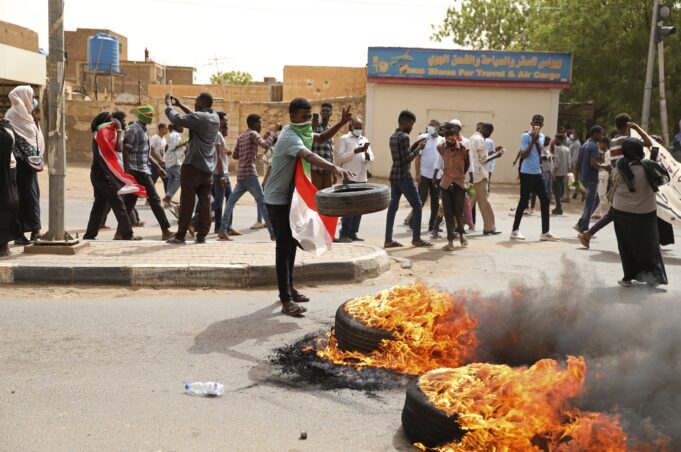Dissatisfaction with government in Sudan is growing. Zakia Muhammad Sadeeg, a former schoolteacher and current executive member of the Sudan Future Campaign (Party), said to Africa Watch via phone from her home in Khartoum that “activists” are calling for demonstrations on the second anniversary of the massacre of peaceful protesters gathered outside Sudan’s military headquarters. Ms. Sadeeg said she’s intending on joining the demonstration.

According to GardaWorld, activists have called for demonstrations in Khartoum, to demand an improvement in economic conditions and the dismissal of Prime Minister Abdallah Hamdok. “Demonstrators are also likely to demand authorities investigate the killing of (over 100) sit-in protesters in 2019,” GardaWorld reported. The website also noted social media reports suggest that protesters were scheduled to rally near the Ministry of Finance June 30.
“Additionally, protesters may gather in areas around downtown Khartoum, Omdurman, and North Khartoum. Similar protests are likely in other major urban centers outside Khartoum,” added garda.com.
“The coalition of pro-democracy groups, Forces of Freedom and Change (FFC), and Sudanese Professional Association (SPA), have sought to pressure Prime Minister Hamdok’s government into accelerating the full transfer of power to civilian rule ahead of Sudan’s elections in late 2022. If protester demands are not met, additional rallies are likely over the short-term,” reported GardaWorld.
Heightened tensions with the administration have been brought on by the removal of subsidies, especially on gas for transportation, cooking and for generators which has caused long waits at petro stations and caused apartments with “24-hour electricity” to be affordable only to the well-to-do.
While inquiring about apartments in Khartoum, Ms. Sadeeg, an acquaintance of this writer, said she had to consider the timed weekly neighborhood blackouts. She said, the only way to get around the blackouts or not having 24-hour electricity is to rent a “flat” in a building with a generator.
Bloomberg.com reported that riddled by years of corruption, mismanagement, and international sanctions under the Bashir regime, “the economy has yet to recover in the almost two years since his ouster, blighted by shortages of essential commodities and inflation that hit 269% in December.”
London’s Financial Times suggests patience is decreasing with Sudanese Prime Minister Hamdok over a serious economic crisis, bequeathed by three decades of the corrupt dictatorship of Omar Al-Bashir, and worsened by U.S. sanctions, which were recently lifted.
“The situation is very bad, I have to do this twice a week,” says 20-year-old Mazin Abdallah, as he waits in a line for two days to refuel the motor cart he uses to deliver dates. “There’s no way to keep sustaining ourselves. I hate to say that economically the situation was better with Bashir,” he told the Financial Times.
Bashir was ousted in 2019 in a military coup, after street protests triggered by a rise in food and fuel prices. When he took over as prime minister over a year ago, Mr. Hamdok, a respected former official of the UN Economic Commission for Africa, vowed to make peace and rebuild the $30bn economy, reported the Financial Times. A 2020 peace deal with Sudan’s rebel groups was a step towards a transition. But economic uncertainty could lead to trouble. Ahmad Yousef, a trader in Khartoum’s gold market, says that “if this continues, the government would collapse.”
Mekki Elmograbi, a columnist on African affairs based in Khartoum, believes, “Hamdok’s initiative as a start for the solution could be the safest way, however, it should be widened and include Islamists within the reconciliation. Otherwise, the situation will push them to the Sudanese streets, which is bad for the government because the streets are ready for a second revolutionary wave.”
Elmograbi raises an important question, that the Sudanese army will not assist in securing a solvent government “and then be criminalized after the stability.” He said, they need “guarantees.”
With the recent arrangements made by the World Bank, IMF and U.S. arranged through a transitional government, what occurs after the transitional government is no more or the transitional government outlives its fractured usefulness?
The U.S. Institute of Peace suggested “the lengthy process of selecting new Cabinet members revealed additional fractures among both signatories to the peace deal and civilian political elements that seemingly offer competing visions for the transition and beyond.”
Elmograbi feels strengthening the transitional government, which includes Islamists not extending it contains the answer.
Protestors took to the streets of Sudan’s capital city and demanded the transitional government resign over its controversial economic reforms, which look more like IMF engineered austerity program. According to Al Jazeera, “Public discontent has mounted over the reforms, backed by the International Monetary Fund (IMF), that slashed subsidies on petrol and diesel, more than doubling their price.”
“We want the fall of the regime” and “No to [IMF] policies,” shouted demonstrators who massed outside the presidential palace in Khartoum on June 30, a day after the IMF approved a $2.5bn loan and debt relief deal.—Follow @JehronMuhammad on Twitter













